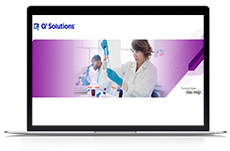
Best Practices for Integrating Biomarkers across the Drug Development Continuum
The use of biomarkers throughout all phases of drug development plays an increasingly important role in the drug approval process. Biomarkers used in early discovery enable companies to identify the most promising drug candidates in preparation for preclinical studies, which help to characterize the safety, efficacy and toxicity of the early drug candidates. The value of a well-designed biomarker strategy then extends to first-in-human studies where the drug's activity, mechanism of action, safety, and proof of concept are tested. Once a drug candidate enters Phase II studies, the use of biomarkers in drug development shifts to identifying subjects that may have better responses to the drug, safety, decisions on dosing, as well as prognostic purposes. A well-designed biomarker strategy is the cornerstone for utilizing precision medicine in a study and determining the right treatment for the right patient. Biomarkers that demonstrate usefulness in patient selection or patient responsiveness may be utilized in further phase III studies and ultimately may lead to diagnostic markers.
Download this presentation to learn more about important concepts of biomarker usage throughout the drug development process and to read case studies that demonstrate the value of biomarkers.
Speakers:
Patrice Hugo, PhD, Chief Scientific Officer
Patrick Hurban, PhD, Senior Director and Global Head, Translational Genomics
Linda Robbie, PhD
Radha Krishnan, MD, Chief Pathologist and Senior Medical Director








